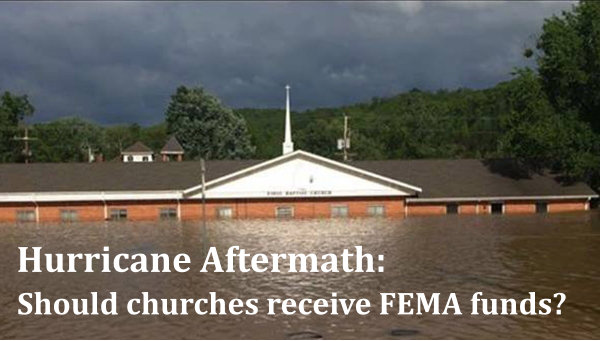By Tyson Thorne

In times of community disasters – natural or otherwise – churches often step up and offer shelter to those affected, and operational space for rescue teams to stage from. Earlier this year my brother-in-law’s church just did that for their community when the fires that burned much of California and Oregon jumped the river and destroyed communities in their home state of Washington. In the case of hurricane Harvey, many churches were flooded – churches that in the past were used by government rescue teams for saving people and pets in the community. Should those churches be eligible for federal aid money?
The federal government doesn’t think so, and the Federal Emergency Management Agency (FEMA) has not paid out assistance to churches, not ever. Now, three churches from Texas are suing FEMA in federal court stating they have as much right to those moneys as other non-profits. The question is, do they? Think-Biblically.com approaches the issue from two sides. Setting aside the politics of the situation for a moment, let’s ask the right question: should churches be looking to the government for monetary help in the first place?
The origins of the church are told in the Bible. First viewed as a sect of Judaism, they met in synagogues. In fact, the very first places Paul visited in each city on all three missionary journeys was the Jewish houses of worship. At that time, Israel wasn’t the theocracy it started out as and was instead under the authority of Rome. While Judaism was a protected religion under Roman rule, once Christianity was identified as a separate faith it became persecuted by the government. Christians could no longer count on their Jewish heritage for assistance, nor could they turn to the government. Thus the home church movement began.
The Jewish temples and synagogues were funded by taxes and tithes collected by religious leaders at certain times of the year, but the fledgling church had to count on the generosity of its people. The book of Acts records Peter accepting a donation from a couple named Ananias and Sapphira (Acts 5) and Paul accepted donations from many, including a female entrepreneur named Lydia (Acts 16). Paul also acts the congregants of city churches to be cheerful givers (2 Corinthians 9.7). Paul himself, and some of the pastors at the time, worked separate jobs so as to not be a burden on the Christian community, essentially volunteering their time for ministry. In no instance did the church accept money from institutions – government or otherwise. The few historic examples we see of this end in disaster (think Judas accepting payment for giving up Jesus, and the establishment of the church of England by its governing authority to escape accountability from the Catholic Church).
While I’m not saying the church and Israel are the same, we do see that God disapproves of Israel trusting in peace accords with secular nations instead of trusting in God. Such actions always result in negative influences among the people of God. The same could be said of government money going to Christian organizations – it always comes with strings attached. This is why many Christian colleges do not accept Government funds, as the government then has a right to demand certain curriculum and policies. It rarely goes well for the institution of faith.
For these reasons Think-Biblically.com thinks it is a mistake for churches to seek FEMA funding to affect repairs. It is our position that the church should rely on its insurance and the generosity of the community it serves to rebuild. And if your church is in a flood plain and doesn’t have flood insurance, or isn’t at least setting money aside for disaster recovery, then you might want to hire a new pastor to go with that new church.
We set aside the political arguments earlier, but they shouldn’t be ignored entirely. The constitution of the United States forbids the government to establish a religion, which to me indicates that government shouldn’t be building churches. Also, since the church is a separate power from government, it does not pay taxes. If one doesn’t pay taxes one shouldn’t expect to get money from the government. I know there are plenty of examples to the contrary; some non-profit organizations are getting money from FEMA, and citizens living below the poverty line do not pay taxes but do receive government benefits. I never said government was consistent, but the word of God is which is why we don’t think politically, we think biblically.
|
|
